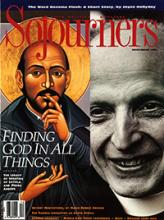To be the only Basque elected superior general of the Society of Jesus since Ignatius of Loyola would have been notable enough when Father Pedro Arrupe, SJ (1907-1991) assumed that post on May 22, 1965. But the parallels between the lives of the first and the 28th leader of the Jesuits go much further.
Both men first embarked on careers well outside religious life: Ignatius as a soldier, Arrupe as a medical student. Each experienced a remarkable conversion that led him to pursue a radically different pathway in life. Both Ignatius and Arrupe left their Basque homeland in search of the best way to serve God -- the former in the Middle East, the latter in Japan. Each served the Catholic Church during turbulent times in that communion's history; each had his difficulties with the ecclesial institution. Both made indelible marks on the Society of Jesus.
So it is that the lives of these two giants of the Jesuit Order are increasingly linked. Indeed the appellation "refounder" or even "second founder" of the Jesuits is heard more and more in reference to Don Pedro, as he was called. None of this should surprise us when we look at the wealth of experience that Arrupe brought to his 18-year ministry as superior of the Jesuits and when his impact on the order and the church is considered.
Japan
Pedro Arrupe became a Jesuit in 1927. After priestly ordination in 1936 he was granted his wish to serve as a missionary in Japan. He arrived in that country in 1938 and began learning the Japanese language and culture, accomplishments that he cherished until the end of his life.
Read the Full Article

